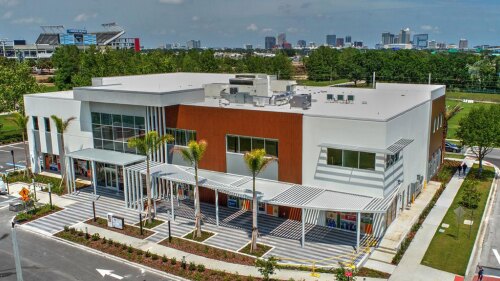Multifamily
The multifamily industry is a significant segment of the global real estate market, with the United States alone having over 170 million households and approximately 800,000 apartment complexes. The sector is expected to continue growing rapidly due to increasing demand for rental housing and ongoing developments.
A new report by the construction scheduling platform Planera shows which U.S. states are adding the most new housing in 2025.
Few properties in South Florida, or ones well beyond the area, embody vision and resilience quite like Pier Sixty-Six. With its unmistakable spire-crowned tower, set along Fort Lauderdale’s storied Intracoastal Waterway, the landmark has defined the city’s skyline for more than half a century. As a multi-billion-dollar redevelopment of this 32 acre (13 ha) waterfront is now complete, Pier Sixty-Six stands as a model for how iconic real estate assets can be reborn, honoring their history while shaping the next century of urban waterfront development.
“The primary advantage every modular project has, if you do it right, is time savings,” said Mark Donahue—principal, design, for Lowney Architecture—during the “Offsite Evolved: How Today’s Prefab, Modular, and 3D-Printing Solutions Deliver Proven Speed, Savings, and Scale” panel at the ULI Fall Meeting in San Francisco. “You can, on a, say, 24-month construction project, save six to eight weeks.”
As congregations across North America grapple with shrinking membership and aging facilities, a new opportunity is emerging: transforming faith-owned land into affordable housing and community-serving spaces. At the 2025 ULI Fall Meeting in San Francisco, panelists in the session “Spiritual Brownfields: Declining Congregations and Opportunities for Housing on Faith-Owned Land” explored how churches and developers are partnering to bring mission-driven housing to underused sacred sites.
At the 2025 ULI Fall Meeting in San Francisco, leaders from across the development and construction industries discussed how they are adapting to a volatile yet stabilizing housing landscape in a session called “Report from the Field: Wrestling with the Cost of Housing Construction.” Despite headlines about tariffs, labor shortages, and inflation, the panelists agreed that the cost environment has settled into what one called a “new normal.”
A panel of insiders reveals what’s true—and false—about the housing crisis and how to fix it.
Making a significant move in the multifamily investment space, industry veteran Matt Ferrari officially launched PXV Multifamily, a private investment firm poised to acquire up to $2 billion in assets over the next 36 months. With a focus on both middle-market value-add properties and institutional-quality opportunities across the United States, PXV stands ready to capitalize on emerging market trends and challenges. Ferrari is an active member of the Urban Land Institute and the Multifamily Blue Flight Product Council.
In 2013, when the founders of Redbrick LMD looked over a large swath of land in Southeast Washington, D.C., they immediately connected with the breathtaking views of the U.S. Capitol, the Washington Monument, the Anacostia River, and expansive green space. They recognized that this kind of access was rare anywhere in the region, but especially in this often-overlooked corner of the city.
The evolution of community efforts to improve access to housing reveals that successful projects often hinge on fostering strong local partnerships that can provide essential supports and services.
The scarcity of on-campus housing—especially affordable housing—means many students have little choice but to forgo the convenience, economy, and other benefits of campus life. Now, California State University, Northridge (CSUN) has become the first in the CSU system to address this disparity by adding new on-campus housing that is both affordable and can be quickly replicated across the entire system to bolster its on-campus populations.
Jeff Lubell recently joined ULI’s Terwilliger Center for Housing as a senior fellow. In this capacity, on a part-time basis, he will provide strategic direction, engage in research, and offer technical support to further the center’s commitment to ensuring that everyone has a home which meets their needs at a price they can afford. He’ll spend the balance of his time working with the Housing Innovations Group, which provides policy consulting services to state and local governments, foundations, nonprofits, and other clients.
The Opportunity Zone program, a national model to spur private investment of housing in underserved areas, has been extended by Congress beyond 2026, marking a significant opportunity for real estate professionals. This innovative initiative not only helps rebuild communities but is a win-win for residents, property developers, and investors. The program’s success in transforming economically distressed areas has proven its value, making it crucial for industry leaders to continue supporting it.

















